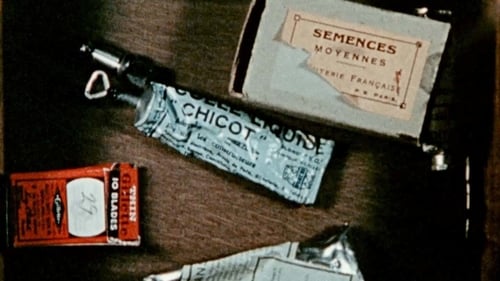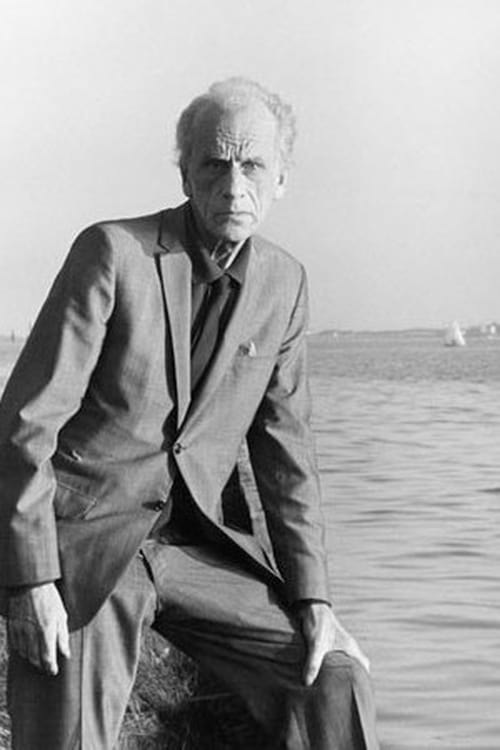Cotillion (1938)
Genre :
Runtime : 8M
Director : Joseph Cornell
Synopsis
"I have not changed the editing structure. I have made the films printable. They are the first known fully collaged films, i.e., films made from found footage, and were done sometime in the ‘40s. Cornell combines Vaudeville jugglers, animal acts, circus performers, children eating and dancing, science demonstrations, mythical excerpts, and crucial freeze-frames of faces into a timeless structure, totally unconcerned with our usual expectations of “montage” or cinematic progression. He collects images and preserves them in some kind of cinematic suspension that is hard – impossible – to describe. But it’s a delight to anyone whose soul has not been squashed by the heavy dictates of Art." —Larry Jordan

A series of papers flutter in the wind in this short film by Hollis Frampton.

The camera pans across a field of flowers at extreme speeds in this short film by Hollis Frampton.

A butchered cow is decapitated in this short film by Hollis Frampton.

A series of ghost-like vehicles drive by in this short film by Hollis Frampton.

The 8 minute short is open to interpretation as it examines the inner thoughts of several people around a table, with the Rita Hayworth version of Put the Blame on Mame playing on the soundtrack.

Sexologists, psychologists, and proponents of sexual freedom, the Kronhausens here attempt to induce erotic response in the audience by carefully chosen visual stimuli and juxtapositions (aimed at both conscious and unconscious). Phallic symbols and open orifices, a tongue licking an orange, an unexpected finger entering the frame: almost any object or act, no matter how innocuous, the Kronhausens show, can be made to appear erotic, and reveals our predisposition towards ‘shaping’ visual evidence for purposes of erotic gratification.

A local council worker inspects three homes.

A six minute film of the funeral of the murdered Metropolitan Emilianos of Grevena, of which all has been lost, save for 17 seconds. Emilianos was murdered on October 1st, 1911.

A soundless mix of story fragments and images. Initially, images of death, a man with a guitar, a soirée. Some images are surreal: an older woman eats a leaf; a headless man pours a cocktail into his body.

Director Joseph Cornell evokes the nostalgia of childhood by filming a children's party.

James Whitney’s Lapis (1966) is a classic work of abstract cinema, a 10-minute animation that took three years to create using primitive computer equipment. In this piece smaller circles oscillate in and out in an array of colors resembling a kaleidoscope while being accompanied with Indian sitar music. The patterns become hypnotic and trance inducing. This work clearly correlates the auditory and the visual and is a wonderful example of the concept of synaesthesia.

The human eye, the human form, the human face: these are the three central images of this avant-garde collage and kaleidoscope of shifting and fractured images, changing colors, and pulsing rhythms. Near the end, a tree appears briefly, and birds fly - first white, then red and blue. Celtic knots morph from one to another. The images become Rorschach tests although the mood, driven by the rapid changing images and the soundtrack, remains frantic.

Filmed at the Alhambra in Spain in just one day, according to Marie Menken. Arabesque for Kenneth Anger concentrates on visual details found in Moorish architecture and in ancient Spanish tile. The date 1961 refers to the addition of Teiji Ito's soundtrack and its subsequent completion, but the film was likely shot in 1960 or earlier. - David Lewis

Featuring a commentary by Noël Burch (in nonsense French), Recreation's rapid-fire montage of single-frame images of incredible density and intensity has been compared to contemporary Beat poetry.

A short film where circus performers entertain children.

Shot in 1959, Scotch Tape is Jack Smith's first film -- a joyous, three-minute romp, in color, using Peter Duchin's rhumba "Carinhoso" for its soundtrack. Three young men merrily bop through the wreckage of razed buildings at the site of what would become Lincoln Center. Apparently, Scotch Tape was never edited and, instead, was cut in the camera by Smith, combining long shots and close-ups while filming mostly from overhead. The title comes from a small strip of scotch tape that was accidentally stuck on the camera and so is visible in the lower-right corner of the frame throughout the film.

Experimental film showing film clips of a garden, with birds chirping for the soundtrack.

A compilation of images co-creator Frank Mouris had collected from magazines interwoven with two narrations, one giving a mostly linear autobiography and the other stating words having to do with the images, the story the first voice is relating, or neither.

A high-speed view of Paris via train-track; Zooming down the Seine by boat. Chomette's first film, Games of Reflections and Speed, traverses tunnels and elevated railways to produce a disarming rhythm.

Avant-garde short focused on the pure elements of film like form, visual composition, and rhythm.




